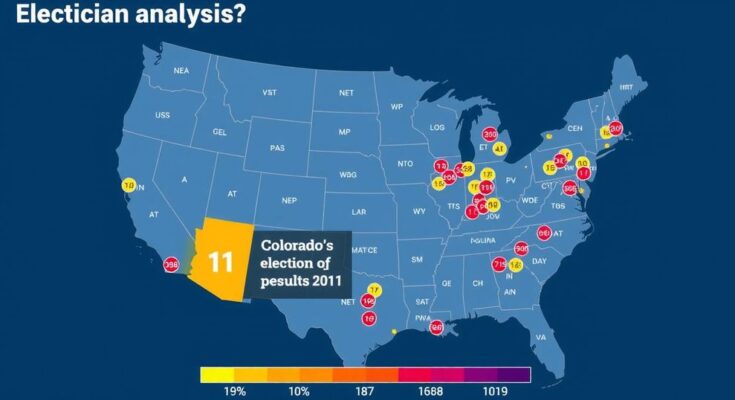The 2024 Colorado election results indicate challenges for Democrats like Yadira Caraveo in Adams County, while Republicans gained ground in both Adams and Pueblo counties. Vote turnout remained significant despite 100,000 active voters abstaining, and Amendment 79 supporting abortion rights passed even in some Republican areas. Proposition 131, however, failed despite considerable financial support. These results reflect evolving political sentiments and strategic implications for future elections.
The analysis of Colorado’s 2024 election reveals significant shifts and trends across various districts. Democratic U.S. Rep. Yadira Caraveo’s failure to secure her seat hinged largely on underperformance in Adams County, where her vote share decreased from 2022. Conversely, Republican Gabe Evans gained traction in the area, which poses a challenge for Democrats as they strategize for future elections. Additionally, Donald Trump saw improvements in both Adams and Pueblo counties compared to his 2020 results, while U.S. Rep. Lauren Boebert’s reelection may be overshadowed by a lackluster performance in traditionally Republican areas. Notably, Democrats faced setbacks in attempting to flip Senate District 5, where Republican Marc Catlin prevailed, reinforcing Republican control. Voter turnout, estimated at around 80%, indicates a substantial number of registered voters did not participate, particularly in the Denver area. Meanwhile, Amendment 79, aimed at safeguarding abortion rights, garnered approval in historically Republican areas, challenging expectations. Finally, despite a $19 million campaign for Proposition 131, an initiative proposing an all-candidate primary, the measure was rejected by voters.
This analysis of the Colorado elections in 2024 showcases the changing political landscape, revealing both victories and losses for various candidates across party lines. The trends emphasize how local factors, including demographic shifts and turnout rates, influence election outcomes. The performance in specific counties, such as Adams and Pueblo, signals essential insights for both Democratic and Republican strategists ahead of future contests. Furthermore, the passage of significant amendments such as Amendment 79 demonstrates changing public sentiments, even within traditionally conservative regions. Lastly, the failure of Proposition 131 despite significant financial backing brought to light the complexities of voter decision-making in state measures.
The 2024 election results in Colorado illustrate a competitive political landscape with pivotal lessons for future campaigns. Candidates such as Yadira Caraveo face challenges in maintaining their constituencies, while Republicans like Gabe Evans expand their appeal in swing districts. The increased engagement on issues like abortion suggests evolving voter priorities, even in GOP strongholds. Alongside these developments, the disappointing failure of separate initiatives underscores the unpredictable nature of voter sentiment and priorities. Thus, both parties must navigate these trends strategically to redefine their approaches in forthcoming electoral cycles.
Original Source: coloradosun.com




